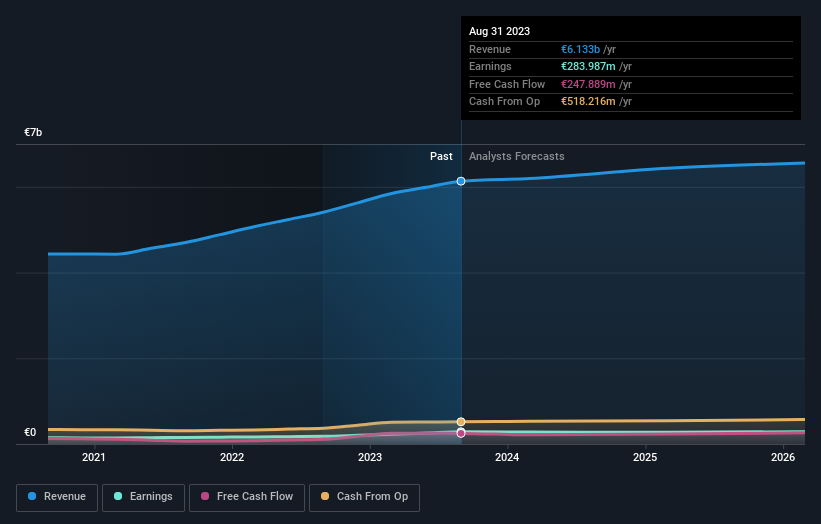Stock Analysis

Key Insights
- Significant insider control over L.D.C implies vested interests in company growth
- A total of 2 investors have a majority stake in the company with 57% ownership
- Using data from analyst forecasts alongside ownership research, one can better assess the future performance of a company
To get a sense of who is truly in control of L.D.C. S.A. (EPA:LOUP), it is important to understand the ownership structure of the business. The group holding the most number of shares in the company, around 70% to be precise, is individual insiders. That is, the group stands to benefit the most if the stock rises (or lose the most if there is a downturn).
So, insiders of L.D.C have a lot at stake and every decision they make on the company’s future is important to them from a financial point of view.
Let's take a closer look to see what the different types of shareholders can tell us about L.D.C.
Check out our latest analysis for L.D.C

What Does The Institutional Ownership Tell Us About L.D.C?
Institutional investors commonly compare their own returns to the returns of a commonly followed index. So they generally do consider buying larger companies that are included in the relevant benchmark index.
As you can see, institutional investors have a fair amount of stake in L.D.C. This suggests some credibility amongst professional investors. But we can't rely on that fact alone since institutions make bad investments sometimes, just like everyone does. If multiple institutions change their view on a stock at the same time, you could see the share price drop fast. It's therefore worth looking at L.D.C's earnings history below. Of course, the future is what really matters.

L.D.C is not owned by hedge funds. The company's CEO Denis Lambert is the largest shareholder with 40% of shares outstanding. Gerard Chancereul is the second largest shareholder owning 17% of common stock, and Cafel Cooperative Company holds about 9.4% of the company stock.
After doing some more digging, we found that the top 2 shareholders collectively control more than half of the company's shares, implying that they have considerable power to influence the company's decisions.
While it makes sense to study institutional ownership data for a company, it also makes sense to study analyst sentiments to know which way the wind is blowing. There are a reasonable number of analysts covering the stock, so it might be useful to find out their aggregate view on the future.
Insider Ownership Of L.D.C
The definition of an insider can differ slightly between different countries, but members of the board of directors always count. Management ultimately answers to the board. However, it is not uncommon for managers to be executive board members, especially if they are a founder or the CEO.
I generally consider insider ownership to be a good thing. However, on some occasions it makes it more difficult for other shareholders to hold the board accountable for decisions.
It seems that insiders own more than half the L.D.C. S.A. stock. This gives them a lot of power. That means insiders have a very meaningful €1.6b stake in this €2.3b business. Most would argue this is a positive, showing strong alignment with shareholders. You can click here to see if they have been selling down their stake.
General Public Ownership
The general public, who are usually individual investors, hold a 12% stake in L.D.C. While this size of ownership may not be enough to sway a policy decision in their favour, they can still make a collective impact on company policies.
Private Company Ownership
It seems that Private Companies own 9.4%, of the L.D.C stock. It's hard to draw any conclusions from this fact alone, so its worth looking into who owns those private companies. Sometimes insiders or other related parties have an interest in shares in a public company through a separate private company.
Next Steps:
I find it very interesting to look at who exactly owns a company. But to truly gain insight, we need to consider other information, too. Case in point: We've spotted 1 warning sign for L.D.C you should be aware of.
If you are like me, you may want to think about whether this company will grow or shrink. Luckily, you can check this free report showing analyst forecasts for its future.
NB: Figures in this article are calculated using data from the last twelve months, which refer to the 12-month period ending on the last date of the month the financial statement is dated. This may not be consistent with full year annual report figures.
Valuation is complex, but we're helping make it simple.
Find out whether L.D.C is potentially over or undervalued by checking out our comprehensive analysis, which includes fair value estimates, risks and warnings, dividends, insider transactions and financial health.
View the Free AnalysisHave feedback on this article? Concerned about the content? Get in touch with us directly. Alternatively, email editorial-team (at) simplywallst.com.
This article by Simply Wall St is general in nature. We provide commentary based on historical data and analyst forecasts only using an unbiased methodology and our articles are not intended to be financial advice. It does not constitute a recommendation to buy or sell any stock, and does not take account of your objectives, or your financial situation. We aim to bring you long-term focused analysis driven by fundamental data. Note that our analysis may not factor in the latest price-sensitive company announcements or qualitative material. Simply Wall St has no position in any stocks mentioned.
About ENXTPA:LOUP
L.D.C
L.D.C. S.A. produces and sells poultry and processed products in France and internationally.
Very undervalued with flawless balance sheet.

